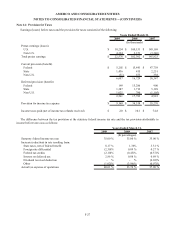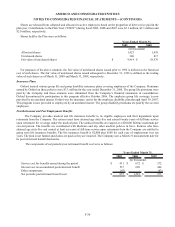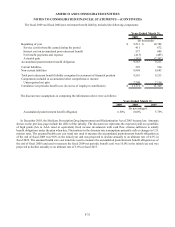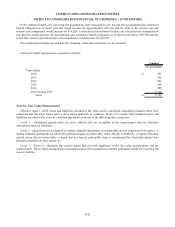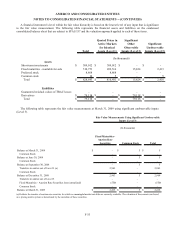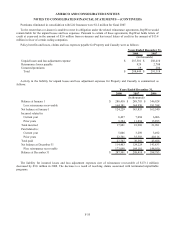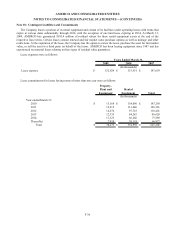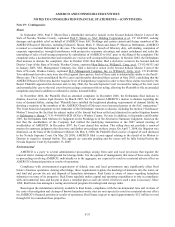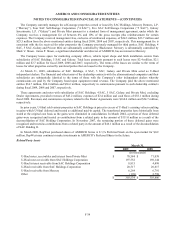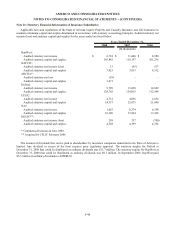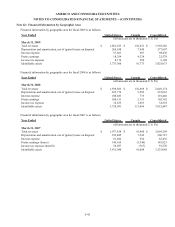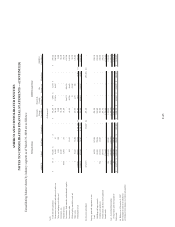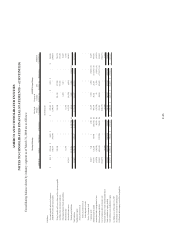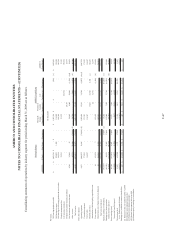U-Haul 2009 Annual Report Download - page 92
Download and view the complete annual report
Please find page 92 of the 2009 U-Haul annual report below. You can navigate through the pages in the report by either clicking on the pages listed below, or by using the keyword search tool below to find specific information within the annual report.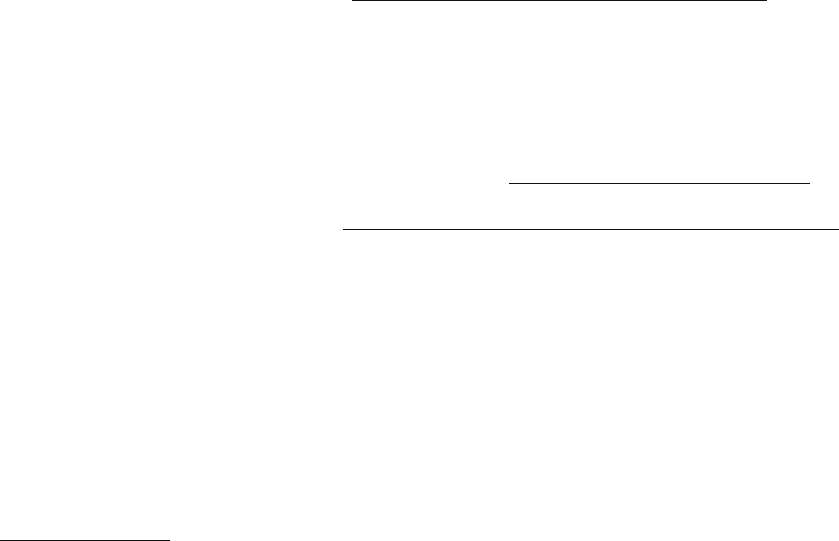
AMERCO AND CONSOLIDATED ENTITIES
NOTES TO CONSOLIDATED FINANCIAL STATEMENTS -- (CONTINUED)
Note 19: Contingencies
Shoen
In September 2002, Paul F. Shoen filed a shareholder derivative lawsuit in the Second Judicial District Court of the
State of Nevada, Washoe County, captioned Paul F. Shoen vs. SAC Holding Corporation et al., CV 02-05602, seeking
damages and equitable relief on behalf of AMERCO from SAC Holdings and certain current and former members of the
AMERCO Board of Directors, including Edward J. Shoen, Mark V. Shoen and James P. Shoen as Defendants. AMERCO
is named as a nominal Defendant in the case. The complaint alleges breach of fiduciary duty, self-dealing, usurpation of
corporate opportunities, wrongful interference with prospective economic advantage and unjust enrichment and seeks the
unwinding of sales of self-storage properties by subsidiaries of AMERCO to SAC prior to the filing of the complaint. The
complaint seeks a declaration that such transfers are void as well as unspecified damages. In October 2002, the Defendants
filed motions to dismiss the complaint. Also in October 2002, Ron Belec filed a derivative action in the Second Judicial
District Court of the State of Nevada, Washoe County, captioned Ron Belec vs. William E. Carty, et al., CV 02-06331 and
in January 2003, M.S. Management Company, Inc. filed a derivative action in the Second Judicial District Court of the
State of Nevada, Washoe County, captioned M.S. Management Company, Inc. vs. William E. Carty, et al., CV 03-00386.
Two additional derivative suits were also filed against these parties. Each of these suits is substantially similar to the Paul F.
Shoen case. The Court consolidated the five cases and thereafter dismissed these actions in May 2003, concluding that the
AMERCO Board of Directors had the requisite level of independence required in order to have these claims resolved by the
Board. Plaintiffs appealed this decision and, in July 2006, the Nevada Supreme Court reversed the ruling of the trial court
and remanded the case to the trial court for proceedings consistent with its ruling, allowing the Plaintiffs to file an amended
complaint and plead in addition to substantive claims, demand futility.
In November 2006, the Plaintiffs filed an amended complaint. In December 2006, the Defendants filed motions to
dismiss, based on various legal theories. In March 2007, the Court denied AMERCO’s motion to dismiss regarding the
issue of demand futility, stating that “Plaintiffs have satisfied the heightened pleading requirements of demand futility by
showing a majority of the members of the AMERCO Board of Directors were interested parties in the SAC transactions.”
The Court heard oral argument on the remainder of the Defendants’ motions to dismiss, including the motion (“Goldwasser
Motion”) based on the fact that the subject matter of the lawsuit had been settled and dismissed in earlier litigation known
as Goldwasser v. Shoen, C.V.N.-94-00810-ECR (D.Nev), Washoe County, Nevada. In addition, in September and October
2007, the Defendants filed Motions for Judgment on the Pleadings or in the Alternative Summary Judgment, based on the
fact that the stockholders of the Company had ratified the underlying transactions at the 2007 annual meeting of
stockholders of AMERCO. In December 2007, the Court denied this motion. This ruling does not preclude a renewed
motion for summary judgment after discovery and further proceedings on these issues. On April 7, 2008, the litigation was
dismissed, on the basis of the Goldwasser Motion. On May 8, 2008, the Plaintiffs filed a notice of appeal of such dismissal
to the Nevada Supreme Court. On May 20, 2008, AMERCO filed a cross appeal relating to the denial of its Motion to
Dismiss in regard to demand futility. The appeals are currently pending and the issues will be fully briefed before the
Nevada Supreme Court by September 13, 2009.
Environmental
AMERCO is a party to several administrative proceedings arising from state and local provisions that regulate the
removal and/or cleanup of underground fuel storage tanks. It is the opinion of management, that none of these suits, claims
or proceedings involving AMERCO, individually or in the aggregate, are expected to result in a material adverse effect on
AMERCO’s financial position or results of operations.
Compliance with environmental requirements of federal, state and local governments may significantly affect Real
Estate’s business operations. Among other things, these requirements regulate the discharge of materials into the water, air
and land and govern the use and disposal of hazardous substances. Real Estate is aware of issues regarding hazardous
substances on some of its properties. Real Estate regularly makes capital and operating expenditures to stay in compliance
with environmental laws and has put in place a remedial plan at each site where it believes such a plan is necessary. Since
1988, Real Estate has managed a testing and removal program for underground storage tanks.
Based upon the information currently available to Real Estate, compliance with the environmental laws and its share of
the costs of investigation and cleanup of known hazardous waste sites are not expected to result in a material adverse effect
on AMERCO’s financial position or results of operations. Real Estate expects to spend approximately $5.2 million in total
through 2011 to remediate these properties.
F-37


